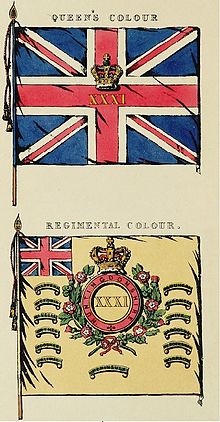31st (Huntingdonshire) Regiment of Foot
| 31st (Huntingdonshire) Regiment of Foot | |
|---|---|

Colours of the 31st (Huntingdonshire) Regiment of Foot
|
|
| Active | 1702–1881 |
| Country |
|
| Allegiance |
|
| Type | Infantry |
| Garrison/HQ | The Barracks, Kingston upon Thames |
| Nickname(s) | The Young Buffs |
| Colors | Buff facings |
| Engagements |
War of the Austrian Succession American Revolutionary War Peninsular War First Anglo-Afghan War Crimean War |
![]() Kingdom of England (1702-1707)
Kingdom of England (1702-1707)![]() Kingdom of Great Britain (1707-1800)
Kingdom of Great Britain (1707-1800)
The 31st (Huntingdonshire) Regiment of Foot was an infantry regiment of the British Army, raised in 1702. Under the Childers Reforms it amalgamated with the 70th (Surrey) Regiment of Foot to form the East Surrey Regiment in 1881.
In 1694, during the Nine Years' War, Sir Richard Atkins was authorised to raise a regiment of foot for service in Ireland. Sir Richard Atkins's Regiment of Foot was duly formed. In 1694 the colonelcy of the unit changed and it became Colonel George Villier's Regiment of Foot. With the signing of the Treaty of Ryswick in 1697 the war came to an end. Villier's Regiment was duly disbanded in 1698.
By 1702 England was again involved in a European conflict which became known as the War of the Spanish Succession. Villiers was commissioned to reform his regiment as marines. In February 1702 George Villier's Regiment of Marines (or the 2nd Regiment of Marines) was reraised.
The unit took part in the capture and defence of Gibraltar in July 1704. It subsequently took part in a number of actions in Spain and the Mediterranean, including the capture of Barcelona and Majorca. The regiment's title changed with the name of its colonel: Alexander Luttrell in 1703, Joshua Churchill in 1706 and Sir Henry Goring in 1711.
...
Wikipedia
